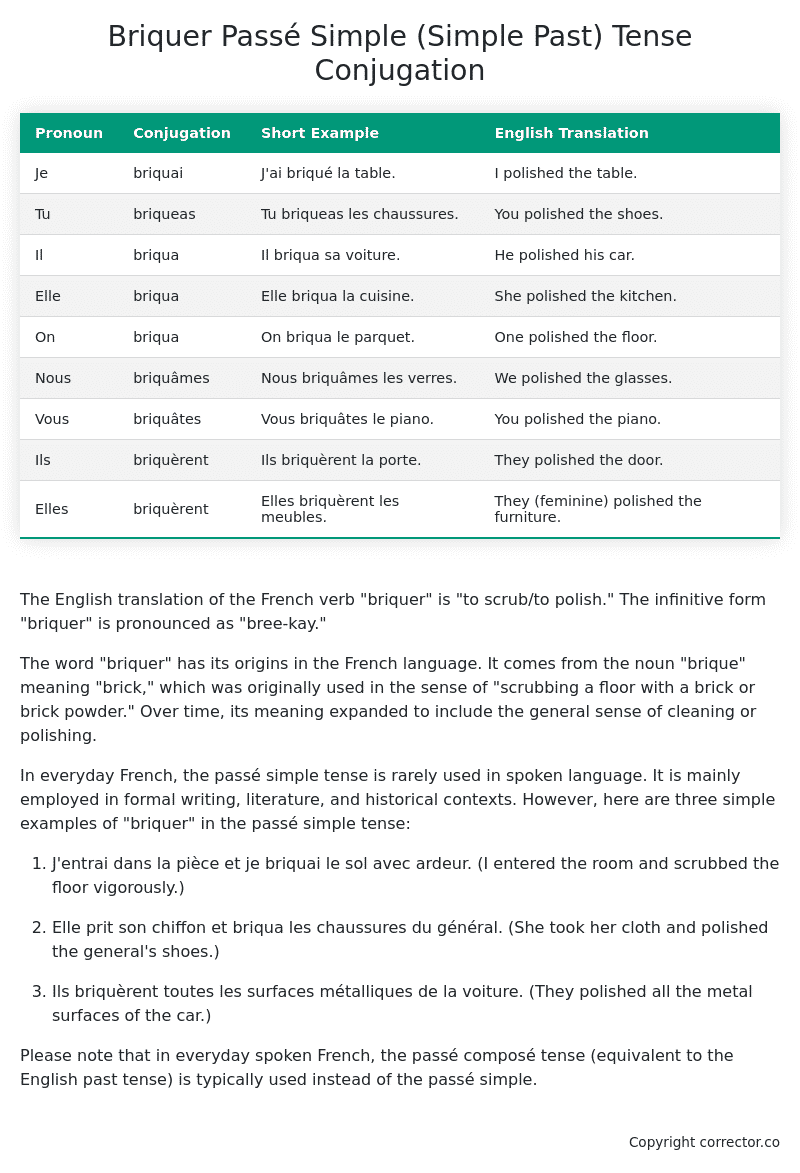Passé Simple (Simple Past) Tense Conjugation of the French Verb briquer
Introduction to the verb briquer
The English translation of the French verb “briquer” is “to scrub/to polish.” The infinitive form “briquer” is pronounced as “bree-kay.”
The word “briquer” has its origins in the French language. It comes from the noun “brique” meaning “brick,” which was originally used in the sense of “scrubbing a floor with a brick or brick powder.” Over time, its meaning expanded to include the general sense of cleaning or polishing.
In everyday French, the passé simple tense is rarely used in spoken language. It is mainly employed in formal writing, literature, and historical contexts. However, here are three simple examples of “briquer” in the passé simple tense:
-
J’entrai dans la pièce et je briquai le sol avec ardeur.
(I entered the room and scrubbed the floor vigorously.) -
Elle prit son chiffon et briqua les chaussures du général.
(She took her cloth and polished the general’s shoes.) -
Ils briquèrent toutes les surfaces métalliques de la voiture.
(They polished all the metal surfaces of the car.)
Please note that in everyday spoken French, the passé composé tense (equivalent to the English past tense) is typically used instead of the passé simple.
Table of the Passé Simple (Simple Past) Tense Conjugation of briquer
| Pronoun | Conjugation | Short Example | English Translation |
|---|---|---|---|
| Je | briquai | J’ai briqué la table. | I polished the table. |
| Tu | briqueas | Tu briqueas les chaussures. | You polished the shoes. |
| Il | briqua | Il briqua sa voiture. | He polished his car. |
| Elle | briqua | Elle briqua la cuisine. | She polished the kitchen. |
| On | briqua | On briqua le parquet. | One polished the floor. |
| Nous | briquâmes | Nous briquâmes les verres. | We polished the glasses. |
| Vous | briquâtes | Vous briquâtes le piano. | You polished the piano. |
| Ils | briquèrent | Ils briquèrent la porte. | They polished the door. |
| Elles | briquèrent | Elles briquèrent les meubles. | They (feminine) polished the furniture. |
Other Conjugations for Briquer.
Le Present (Present Tense) Conjugation of the French Verb briquer
Imparfait (Imperfect) Tense Conjugation of the French Verb briquer
Passé Simple (Simple Past) Tense Conjugation of the French Verb briquer (You’re reading it right now!)
Passé Composé (Present Perfect) Tense Conjugation of the French Verb briquer
Futur Simple (Simple Future) Tense Conjugation of the French Verb briquer
Futur Proche (Near Future) Tense Conjugation of the French Verb briquer
Plus-que-parfait (Pluperfect) Tense Conjugation of the French Verb briquer
Passé Antérieur (Past Anterior) Tense Conjugation of the French Verb briquer
Futur Antérieur (Future Anterior) Tense Conjugation of the French Verb briquer
Subjonctif Présent (Subjunctive Present) Tense Conjugation of the French Verb briquer
Subjonctif Passé (Subjunctive Past) Tense Conjugation of the French Verb briquer
Subjonctif Imparfait (Subjunctive Imperfect) Tense Conjugation of the French Verb briquer
Subjonctif Plus-que-parfait (Subjunctive Pluperfect) Tense Conjugation of the French Verb briquer
Conditionnel Présent (Conditional Present) Tense Conjugation of the French Verb briquer
Conditionnel Passé (Conditional Past) Tense Conjugation of the French Verb briquer
Conditionnel Passé II (Conditional Past II) Tense Conjugation of the French Verb briquer
L’impératif Présent (Imperative Present) Tense Conjugation of the French Verb briquer
L’impératif Passé (Imperative Past) Tense Conjugation of the French Verb briquer
L’infinitif Présent (Infinitive Present) Tense Conjugation of the French Verb briquer
L’infinitif Passé (Infinitive Past) Tense Conjugation of the French Verb briquer
Le Participe Présent (Present Participle) Tense Conjugation of the French Verb briquer
Le Participe Passé (Past Participle) Tense Conjugation of the French Verb briquer
Struggling with French verbs or the language in general? Why not use our free French Grammar Checker – no registration required!
Get a FREE Download Study Sheet of this Conjugation 🔥
Simply right click the image below, click “save image” and get your free reference for the briquer Passé Simple tense conjugation!

Briquer – About the French Passé Simple (Simple Past) Tense
Formation
Usage
Narration
Historical Context
Interactions with other tenses
Passé Composé
Imparfait
Conditional and Subjunctive
Summary
I hope you enjoyed this article on the verb briquer. Still in a learning mood? Check out another TOTALLY random French verb conjugation!


